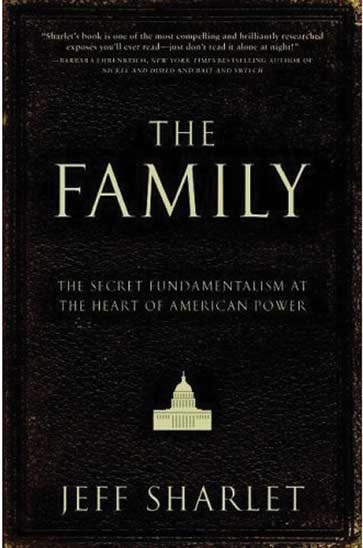 This is a response to James Crabtree's review of The Family: The Secret Fundamentalism at the Heart of American Power by the book's author, Jeff Sharlet
This is a response to James Crabtree's review of The Family: The Secret Fundamentalism at the Heart of American Power by the book's author, Jeff Sharlet
In his review of my book, The Family, James Crabtree faults me for failing to prove the "conspiracy [I] claim to unveil." At least Crabtree got one thing right: no conspiracy is unveiled in The Family. But that's no big secret. In fact, I'm not sure how I could have made my view of conspiracy theories clearer than this, on page 7 of my introduction, referring to Christian Right leader Chuck Colson's description of the Family as a "veritable underground": "This so-called underground," I write, "is not a conspiracy."
If that's too vague for Crabtree, there's always this, later in the book, referring to Family founder Abram Vereide: "Abram's upper-crust faith was not a conspiracy." And if Crabtree was still confused, he might have skipped ahead further, to this, in response to current Fellowship leader Doug Coe's documented decision to "submerge" the profile of the organisation: "The decision was not so much conspiratorial, as it seemed to those among Abram's old-timers who responded with confusion, as ascetic, a humbling of powers."
Is The Family secretive? Yes, by its own declaration. "The more you can make your organization invisible," declares Coe, "the more influence it will have." Does that make it a conspiracy? No; that's political strategy, and, to Coe's mind, a kind of theology. As I argue in the book Crabtree evidently skimmed, the Family represents a strand of evangelical activism that has clearly been influential among some of America's most powerful Christians and yet which to date has never been subject to any kind of in-depth study. That's a more modest claim than Crabtree's suggestion that I meant to write "a real life Da Vinci Code," but one that would have saved Crabtree some disappointment had he bothered to review my book rather than, apparently, his own predilection for crackpot thrillers.
Crabtree accuses me of using a "deliberately post 9/11 vocabulary, "offering as an example the term "prayer cell". But, as I write upon introducing the term - the Family's, not mine - "The Family's use of the term 'cell' long predates the word's current association with terrorism. Its roots are in the Cold War, when leaders of the Family deliberately emulated the organizing techniques of communism. In 1948, a group of Senate staffers met to discuss ways that the Family's 'cell and leadership groups' could recruit elites unwilling to participate in the 'mass meeting approach' of populist fundamentalism."
In short, what does 9/11 have to do with anything here, besides Crabtree's clichéd sense of history, lifted, it seems, not from scholarship or research but the warmed-over pablum of American news magazines? Crabtree, carefully patrolling the borders of conventional wisdom, finds my conclusion that "the revivals that have been sweeping the nation with generational regularity since its inception are not flare-ups, but the natural temperature of American empire" at odds with the conspiracy theory he attributes to me – as, indeed, it is. But not likely a surprise to a reader who bothers with the introduction, in which I argue that "from Jonathan Edwards and the Revolutionary War that followed the First Great Awakening to the War on Terror, the theocratic strand has been woven into the American fabric, never quite dominant but always stronger and more enduring than those who imagine religion to be a personal, private affair realize." Too many of my fellow secularists, I note, recognise "radical religion only when it marches into the public square, bellowing its intentions."
That describes Crabtree, who strangely dates the ascendance of the activist religious right in America to 1988, as if Pat Robertson was a creation of that year's presidential campaign - and not the son of Senator Absalom Willis Robertson, a leader of the Vereide's organisation as early as 1948, when he boasted that 48 senators and 150 representatives had submitted themselves to Vereide's gospel of free market fundamentalism and American power, leading him to believe that "we have found the man and the formula for exceptional Christian results in the common sense evangelizing work of Christ's kingdom."

